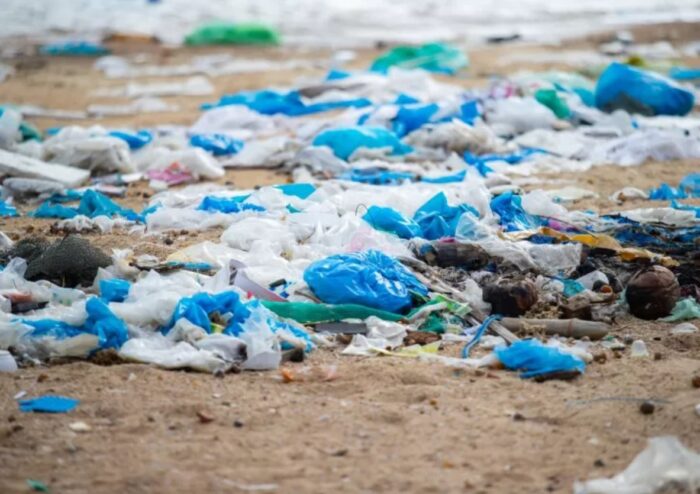Jun 23 2025
Plastic Bag Policies Have An Effect
 There is a lot of talk concerning the growing plastic waste problem in the world, and that’s because it is a real and serious problem. The world produces about 430 million tons of plastic waste per year, and this is steadily increasing over time. About 6 millions tons of this will end up in water environments – rivers, lakes, shorelines, and the ocean. This plastic can be disruptive to marine life through entanglement, ingestion, and contamination.
There is a lot of talk concerning the growing plastic waste problem in the world, and that’s because it is a real and serious problem. The world produces about 430 million tons of plastic waste per year, and this is steadily increasing over time. About 6 millions tons of this will end up in water environments – rivers, lakes, shorelines, and the ocean. This plastic can be disruptive to marine life through entanglement, ingestion, and contamination.
There is a bit of semi-good news – a recent study finds that policies aimed at reducing single-use plastic bags are somewhat effective. They used data from apps used by people who clean up waste along the shoreline. The apps track how much and what kind of waste they pick up. This was a convenient source of study data. It is also true that in the US there is no Federal ban on plastic bags, so the researchers were able to compares local, county, and state-wide policies limiting plastic bag use. They could also compare the two main types of policies, bans and fees.
They found that areas with plastic bag policies had 25 – 47% reduced plastic bag waste compared to areas without such policies. The effect was greater over time, and was greater in areas with higher initial plastic bag waste. They also found that plastic bag fees were more effective than bans, which I found interesting. Partial bans were the least effective. Policies at all governmental scales were effective, with state level policies being the most effective.
But – and here is the reason for my caveats above – in all areas the absolute amount of plastic waste increased over the study period. There was only a decrease in the relative amount of increase in areas with a policy compared to those without. So policies decrease the rate of increase of plastic waste. How can this data inform policies going forward?
First, let me yet again bring up the question of whether such issues should be dealt with at the individual level, the corporate level, or the societal level. We could just do aggressive public service announcements telling people how they can minimize their own personal plastic waste. We can also institute regulations that affect both producers and consumers. This study looked just at consumer level policies.
Generally speaking, focusing at the individual level has limited effectiveness. It can move the needle a little, and if you are concerned about plastic waste there are things you can do to limit your personal plastic footprint. Perhaps the most effective outcome of this approach is if consumer behavior reaches a tipping point, where industry begins to respond by taking action themselves. Companies can phase out their use of many types of single-use plastic if they feel consumer opinion would reward them for this behavior (enough to offset any increased cost). This has been happening, of course, but this approach has not even stopped the increase in plastic waste, let alone reduce it.
Here we see that local to state level policies are effective, but again in just reducing the rate of increase. If we are serious about the plastic waste problem it seems we need more effective policy. The evidence also suggests that national level policy would be the most effective. What would this look like?
This is where things always get tricky. I favor evidence-based thoughtful and well crafted regulations that fairly take into account externalized costs, environmental safety, and consumer interests. But at the same time such policy should not be unnecessarily burdensome to industry, be inefficient in execution, create perverse incentives, or encourage bad behavior to skirt the regulations. This takes experienced policy makers informed by scientists, industry, consumer groups, and environmental groups. And where are we going to make these policies? As Rodney Dangerfield might say – “How about fantasy land.”
Seriously – we can sometimes get such well-crafted policy, and we should definitely expect and demand it from our elected officials. But too often we don’t get such policy – we get politics, and lobbying, and crony capitalism.
In any case, there is some low-hanging fruit that we can address through some targeted regulations. Plastic is a great substance with lots of convenient and cost-effective uses. I am not against plastic in general. But some specific uses are not necessary and generate a disproportionate amount of harmful waste, such as the single-use plastic bags. We don’t need them. There are better alternatives. Reusable bags are the best. Paper bags have a higher upfront cost in terms of production and transport than plastic bags, but they are biodegradable are so are better at the back end. If you reuse a paper bag a few times, however, it is better than plastic in terms of energy use also. Personally I prefer the reusable bags anyway – they can hold more groceries and are more comfortable to carry.
We also need some global infrastructure changes so that plastic waste does not end up in waterways and a higher percentage of it is recycled. Our global industry is collectively so large that we have to think about the full life cycle of the stuff we produce. We just need to do things a little smarter.






